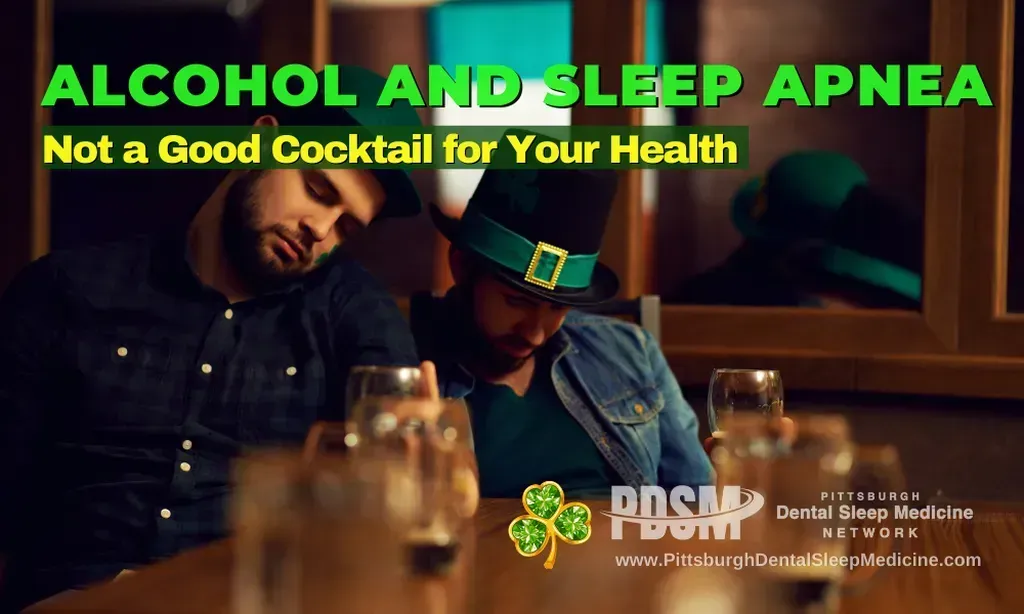Alcohol and Sleep Apnea: Not a Good Cocktail for Your Health

It's the day after St. Patrick’s Day…. Even though the COVID pandemic has put an enormous damper on social gatherings and celebrations, if you still found a way to pay homage to St Patrick, one of Ireland's patron saints...
It's the day after St. Patrick’s Day….
Even though the COVID pandemic has put an enormous damper on social gatherings and celebrations, if you still found a way to pay homage to St Patrick, one of Ireland's patron saints, in the traditional fashion with a wee bit ‘O Guinness or Jameson Irish Whiskey, you may have gotten a pretty “Manky” night of sleep.
The obvious culprit of your morning misery would be described as a hangover, but if you suffer from Obstructive Sleep Apnea, there could be more involved with your ante meridiam anguish.
Alcohol use worsens the risk of sleep apnea because it inhibits your body's ability to breathe while sleeping. Alcohol not only relaxes YOU, but it also relaxes the muscles in your throat making it more likely for the upper airway to collapse, causing snoring or Obstructive Sleep Apnea (OSA). Your body responds by gasping for air, a process that disrupts your sleep.
While the relaxing influence of alcohol on sleep results in some degree of airway collapse in everyone, generally, it can seriously endanger someone with OSA because the breathing passages can become completely blocked and deprive the body of oxygen.
Anyone can develop sleep apnea, including children. Both males and females suffer from this disorder, although men are more than twice as likely as women to develop sleep apnea.
What Are the Symptoms of Sleep Apnea?
Snoring is a primary symptom of sleep apnea, although not everyone who snores has the condition. Additional symptoms include:
- Excessive sleepiness during the daytime
- Abruptly waking up by choking or gasping
- Decreased sex drive
- Nighttime sweating
- Waking with a headache
- Cognitive challenges during the day
- High blood pressure
- Waking with a sore throat or dry mouth
Very often, your sleep partner or family members notice the signs of sleep apnea before you. If you’ve been told you snore loudly, gasp for air, or seem restless during sleep, it may be time to see a specialist.
Other Causes of Sleep Apnea
There is no single cause for sleep apnea, but there are conditions that increase your risk level. Any of the following conditions can contribute to the development of sleep apnea.
- Excess body weight
- Chronic nasal conditions
- Narrow airways
- Family history of sleep apnea
- Smoking
Not everyone with these conditions will also suffer from sleep apnea, but understanding what to look for can help you take a proactive stance toward your health.
How Do You Treat Sleep Apnea?
Your treatment path depends on your overall health and the severity of your sleep apnea. In cases where an underlying medical condition might be to blame, treating that condition is often the first step.
Some men and women respond well to a therapy called continuous positive airway pressure, or CPAP. This involves wearing a mask that directs a steady stream of air into your airway while you sleep.
When CPAP is not an option, or you prefer a different approach, Pennsylvania Dental Sleep Medicine offers oral appliances as a great alternative to CPAP. These devices are worn in your mouth while you sleep, and help keep your airway open. They are noninvasive and nonintrusive, offering a custom fit, and are comfortable to wear.
In rare cases, surgery is the best way to address sleep apnea.
If you’re suffering from sleep apnea, schedule an appointment with Pennsylvania Dental Sleep Medicine online or by calling (717) 995-3590 today to explore treatment options. Dr. Becky Fox has achieved Diplomate status from the American Board of Dental Sleep Medicine.
Source Attribution for some of this blog's content:


